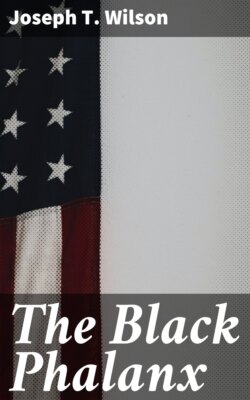Читать книгу The Black Phalanx - Joseph T. Wilson - Страница 33
На сайте Литреса книга снята с продажи.
THE WAR OF 1775.
ОглавлениеTable of Contents
The history of the patriotic Negro Americans who swelled the ranks of the Colonial and Continental armies has never been written, nor was any attempt made by the historians of that day to record the deeds of those who dared to face death for the independence of the American Colonies. W. H. Day, in addressing a convention of negro men at Cleveland, O., in 1852, truly said: "Of the services and sufferings of the colored soldiers of the Revolution, no attempt has, to our knowledge, been made to preserve a record. Their history is not written; it lies upon the soil watered with their blood; who shall gather it? It rests with their bones in the charnel house; who shall exhume it?" Upon reading these lines, it occurred to me that somewhere among the archives of that period there must exist at least a clue to the record of the negro patriots of that war. If I cannot exclaim Eureka, after years of diligent search, I take pride in presenting what I have found scattered throughout the pages of the early histories and literature, and from the correspondence of men who in that period discussed the topics of the day—who led and fashioned public opinion, many of whom commanded in the field. Not a few biographers have contributed to my fund of knowledge. To avoid as much as possible the charge of plagiarism I have aimed to give credit to my informants for what shall follow regarding the colored patriots in the war of the Revolution. I have reason to believe that I have gathered much that has been obscure; that I have exhumed the bones of that noble Phalanx who, at Bunker Hill and Yorktown, in various military employments, served their country. It is true they were few in number when compared to the host that entered the service in the late Rebellion, but it must be remembered that their number was small at that time in the country, and that the seat of war was at the North, and not, as in the late war, at the South, where their numbers have always been large.
Of the three hundred thousand troops in the Revolutionary war, it has been estimated that five thousand were colored, and these came principally from the North, whose colored population at that time was about 50,000, while the Southern colonies contained about 300,000. The interest felt in the two sections for the success of the cause of independence, if referred to the army, can easily be seen. The Northern colonies furnished two hundred and forty-nine thousand, five hundred and three, and the Southern colonies one hundred and forty-seven thousand, nine hundred and forty soldiers, though the whole population of each section was within a few hundred of being equal.
The love of liberty was no less strong with the Southern than with the Northern colored man, as their efforts for liberty show. At the North he gained his freedom by entering the American army; at the South, only by entering the British army, which was joined by more than fifteen thousand colored men. Jefferson says 30,000 negroes from Virginia alone went to the British army. I make the digression simply to assert that had the colored men at the South possessed the same opportunity as those at the North, of enlisting in the American army, a large force of colored men would have been in the field, fighting for America's independence. Of the services of the little band, scattered as they were throughout the army, two or three in a company composed of whites, a squad in a regiment, a few companies with an army, made it quite impossible for their record, beyond this, to be distinct from the organizations they were attached to. However, enough has been culled from the history of that conflict, to show that they bore a brave part in the struggle which wrested the colonies from the control of Great Britain, and won for themselves and offspring, freedom, which many of them never enjoyed. I have studiously avoided narrating the conduct of those who cast their fortune with the British, save those who went with Lord Dunmore, for reasons too obvious to make mention of.
The sentiments of a majority of the people of the colonies were in full accord with the declaration opposing slavery, and they sought to give it supremacy by their success in the conflict. Slavery, which barred the entrance to the army of the colored man at the South, had been denounced by the colonist before the adoption of the articles of confederation, and was maintained solely by local regulations. As early as 1774, all the colonies had agreed to, and their representatives to the congress had signed, the articles of the Continental Association, by which it was agreed, "that we will neither import nor purchase any slave imported after the first day of December next, (1774), after which we will wholly discontinue the slave trade, and will neither be concerned in it ourselves, nor will we hire our vessels, nor sell our commodities or manufactories to those who are concerned in it." Georgia not being represented in this Congress, consequently was not in the Association, but as soon as her Provincial Congress assembled in July, 1775, it passed the following resolutions:
